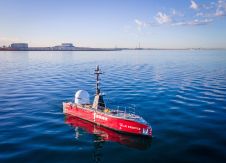Turning Hydrographic Graduates into Competent Surveyors
The number of years required for training a hydrographic surveyor before attaining the required competence in terms of knowledge and experience involves a collaborative, proper tutelage by training institutions and the industries.<P>
In the past, students learnt theoretical knowledge and carried out field practicals during their studies. Many did not have opportunities to carry out their internship or industrial training outside their colleges. This could be attributable to a number of factors, such as the lack of such arrangements in their training syllabus, lack of competent industries with state-of-the-art equipment, training and supervision. Thus, once graduated from their study, they lacked the required experience and prospects. The implication was therefore that industries would absorb them, hoping that their new recruit would be a fast on-the-job learner.
However, in this new era of ICT-based learning, it is expected that students' curricula should reflect these developments towards acquiring more enhanced knowledge and experience during their study, so that they can be absorbed into the industries as quickly as possible once they graduate. As a result, less time is allocated for new employees to familiarise themselves with their work environment and they can concentrate on the jobs at hand immediately.
One way of achieving this is to have a well co-ordinated internship programme outside colleges or to carry out industrial training in a commercial sector for a period of at least six months.
Nevertheless, certain employers will still need to send their existing staff for various related training, and for re-training of new staff to enhance their productivity. Some employers will not even attach any bond of contract for these deserving staff while undergoing the training - whether near or far. Either way, the required competency must be achieved and the training will be beneficial to all parties concerned.
Examples of such employers are common in the industries: Fugro is a notable example. Fugro employees worldwide are usually sent on a hydrographic surveyor training programme at the Universiti Teknologi Malaysia (UTM); similarly for FIG/IHO/ICA Category A and Category B courses and at other established institutions.
Continuous efforts are required by colleges to equip their students with the necessary knowledge to meet industry demands. This task cannot be compromised. The industry needs graduates who are capable of adapting to their work specifications without going through extended periods of working under supervision. Of greatest importance is that they can meet the challenges and stresses that lie ahead.
Colleges providing this special unit for students' industrial training should put in place measures for assessing student performance for coping with stress - within and outside the colleges, rather than being used for any personal gains. Stress management should be introduced to students while studying because this will be an added advantage to them and their employer when they graduate.
All hydrographic institutions should therefore recognise the desired requirement of industrial training experience for their students and give them the correct knowledge, skill set and competency for our ever-demanding hydrographic industries.

Value staying current with hydrography?
Stay on the map with our expertly curated newsletters.
We provide educational insights, industry updates, and inspiring stories from the world of hydrography to help you learn, grow, and navigate your field with confidence. Don't miss out - subscribe today and ensure you're always informed, educated, and inspired by the latest in hydrographic technology and research.
Choose your newsletter(s)
























